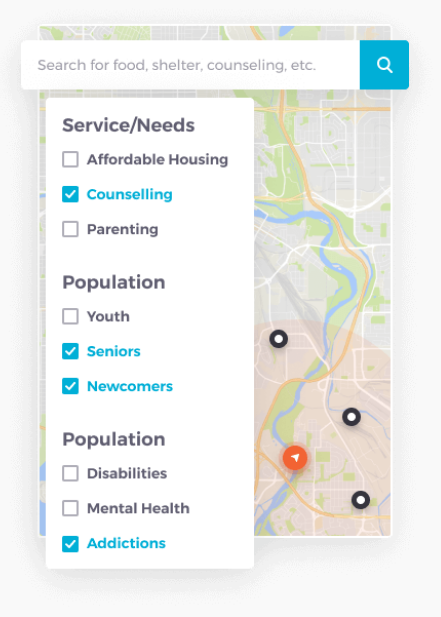By Naomi Mahaffy
HelpSeeker.org is a new social innovation tech company based in Calgary, Alberta. It recently launched a platform designed to transform how people find and access social and health services.
How it began
As the former Vice President of the Calgary Homeless Foundation and an experienced collective impact and systems planning consultant, Dr. Alina Turner has spent a lot of time and energy looking at how to solve complex social problems in Canadian communities. She is often hired to help communities assess needs, coordinate resources, and build strategies to address complex issues like mental health and homelessness. As someone who has experience homelessness, she has been both assisted and frustrated by the social service system in Canada and Europe.
Over the years, Dr. Turner’s frustration grew as she saw agencies failing to work together to make their services easy to access, coordinated, and efficient. “It gets really tiring,” she explained. “Communities hire people like me to say the same things to them over and over, but not much changes in terms of how readily people can find help when they need it.” Turner estimates that $27 billion is spent annually on a vast array of services to address mental health, addiction, homelessness, violence and poverty in Canada (see this recent paper she co-authored with Calgary Homeless Foundation’s Diana Krecsy). And yet many people don’t know where and how to access help when they experience mental health issues, homelessness, or other challenges.
In 2017, Dr. Turner and her husband Travis Turner decided to create a solution to make it easier for people to access the help they need. Travis was a school administrator and teacher who faced daily challenges trying to support vulnerable youth and their parents access services to address mental health, addictions, trauma and bullying. With their own funds, the Turners built a prototype of HelpSeeker--a free location-based app that matches people with the resources and support they need. The app is populated with open data about programs and resources for mental health, counselling, addictions, housing, and other services.
HelpSeeker partnered with Medicine Hat, Alberta to roll out the prototype in early 2018, and then launched the full app in April. Since then, they’ve been building partnerships to bring the app into more communities across Alberta, with the goal of rolling it out more broadly across Canada later this year.
How it works
HelpSeeker typically approaches the municipality or lead service coordination agency in a community and invites them to partner to bring the platform to their town or city. The community can use service listings for free; basic data about service providers in the community is already mapped in the app from open data sources. Agencies can “claim” their listings on the app and enter up-to-date information about their programs and services (e.g. number of beds available, client eligibility criteria, etc). The app allows people looking for help to search an interactive map that lists and filters available programs and services. After they visit an agency, clients can anonymously provide feedback about their experiences.
Some agencies choose to purchase premium accounts, allowing them to access analytics on the back end of the app to better understand resource flows, gaps and redundancies in services, system occupancy, and user statistics. This gives funders, policy-makers, and collaboratives real-time information to inform their decision making and planning. To date, the cities of Hamilton, Lethbridge, Medicine Hat, and Abbotsford, as well as the Government of Canada, are paying for these analytics services. HelpSeeker’s team uses funds from those subscriptions to improve the app’s data, interfaces, and components and to cover operational and staffing costs.
Why take note now?
HelpSeeker is a tech startup with a social mission; it’s prioritizing impact while aiming to be financially sustainable and create jobs like other businesses. It will be interesting to see how the organization’s business model, team, and platform evolve over time.
As more agencies sign up for this platform’s analytics services, communities will gain greater insights into funding flows, redundancies, and opportunities within their systems. Over time, this might lead to innovations and disruptions in terms of how service agencies coordinate, communicate, and plan together.
What’s next for HelpSeeker?
HelpSeeker has a federal contract to pilot the platform in ten cities across Canada. They are also using their national dataset to prototype AI /machine learning, to improve how the app recommends resources based on previous interactions. Their dataset is now being mined by academics in Alberta, Ontario and Saskatchewan to inform understandings of services and user interfaces within different regions.
HelpSeeker is expanding with the intent to finish onboarding Canadian communities in 2019; this will ready them for expansion into the US and UK in 2020. Follow their progress on twitter and check out their platform at www.helpseeker.org.
ABSI Connect works to connect, align, celebrate, strengthen, and learn from Albertan change-makers who are finding innovative ways to address the complex problems their communities face. Do you have a story, idea, or insight you’d like to share with the ABSI Connect community? Let us know.



